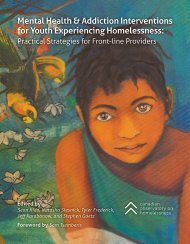Without A Home: The National Youth Homelessness Survey
You also want an ePaper? Increase the reach of your titles
YUMPU automatically turns print PDFs into web optimized ePapers that Google loves.
<strong>The</strong> implications of this research for policy and practice are clear. More must be done<br />
to help young people who experience homelessness to reengage in school and achieve<br />
success. This includes ensuring that necessary supports are in place for the young people<br />
who are marginalized because of learning disabilities or bullying. A key strategy should<br />
be ensuring that programmatic supports are in place for young people while they are<br />
homeless, as well as within programs that help youth exit homelessness, such as Housing<br />
First for <strong>Youth</strong>. If we want positive, long-term benefits for young people who have<br />
experienced homelessness, we have to help them get back into and succeed in school.<br />
5.6 <strong>The</strong> Need to Support <strong>Youth</strong> with<br />
Mental Health Challenges<br />
It is well established that mental health and<br />
addictions can be pathways into homelessness. At<br />
the same time, the challenges that accompany life<br />
on the streets often worsen pre-existing mental<br />
health struggles. Our survey results confirm this. A<br />
high percentage of the youth surveyed (85.4%) fell<br />
in the ‘high’ symptom/distress category, meaning<br />
they require considerable mental health supports.<br />
Moreover, 42% of participants reported at least<br />
one suicide attempt and 35.2% reported having at<br />
least one drug overdose requiring hospitalization.<br />
Length of time on the streets also exacerbates the<br />
situation. Young people who experience forms<br />
of adversity prior to becoming homeless, such<br />
as child protection involvement, physical and<br />
sexual abuse, and neglect, were more likely to<br />
experience poorer mental health, suicide attempts,<br />
a lower quality of life, and negative psychological<br />
resilience. Likewise, exposure to physical and<br />
sexual violence once on the streets negatively<br />
impacted mental health for these youth.<br />
85.4%<br />
of youth fell in the<br />
‘high’ symptom/<br />
distress category<br />
42%<br />
reported at least<br />
one suicide attempt<br />
35.2%<br />
reported at least<br />
one drug overdose<br />
requiring hospitalization<br />
WITHOUT A HOME: THE NATIONAL YOUTH HOMELESSNESS SURVEY<br />
105

















